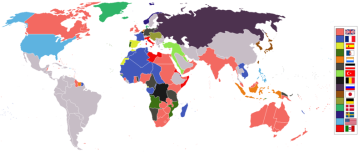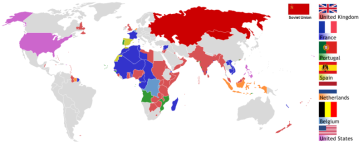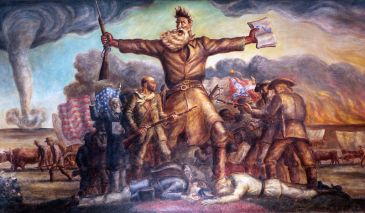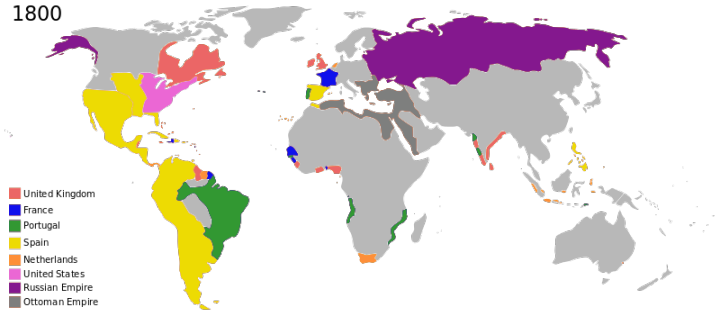By John Scales Avery*
Hobson’s explanation of colonialism
The Industrial Revolution opened up an enormous gap in military strength between the industrialized nations and the rest of the world. Taking advantage of their superior weaponry, Europe, the United States and Japan rapidly carved up the remainder of the world into colonies, which acted as sources of raw materials and food, and as markets for manufactured goods.
Between 1800 and 1914, the percentage of the earth under the domination of colonial powers increased to 85 percent, if former colonies are included.
The English economist and Fabian, John Atkinson Hobson (1858-1940), offered a famous explanation of the colonial era in his book “Imperialism: A Study” (1902).
According to Hobson, the basic problem that led to colonial expansion was an excessively unequal distribution of incomes in the industrialized countries.
The result of this unequal distribution was that neither the rich nor the poor could buy back the total output of their society.
The incomes of the poor were insufficient, and rich were too few in number. The rich had finite needs, and tended to reinvest their money.
As Hobson pointed out, reinvestment in new factories only made the situation worse by increasing output.
Hobson had been sent as a reporter by the Manchester Guardian to cover the Second Boer War. His experiences had convinced him that colonial wars have an economic motive.
Such wars are fought, he believed, to facilitate investment of the excess money of the rich in African or Asian plantations and mines, and to make possible the overseas sale of excess manufactured goods.
Hobson believed imperialism to be immoral, since it entails suffering both among colonial peoples and among the poor of the industrial nations. The cure that he recommended was a more equal distribution of incomes in the manufacturing countries.

***Map of world empires and colonies in 1914, just before the First World War. | Author: Andrew0921 | Wikimedia Commons
Colonialism and the outbreak of World Wars I and II
The First World war broke out almost exactly 100 years ago, and much thought has been given to the causes of this tragic event, whose consequences continue to cast a dark shadow over the human future.
When the war ended four years later, ten million young men had been killed and twenty million wounded, of whom six million were crippled for life.
The war had cost 350,000,000,000 1919 dollars. This was a calculable cost; but the cost in human suffering and brutalization of values was incalculable.
It hardly mattered whose fault the catastrophe had been. Perhaps the Austrian government had been more to blame than any other. But blame for the war certainly did not rest with the Austrian people nor with the young Austrians who had been forced to fight.
However, the tragedy of the First World War was that it created long-lasting hatred between the nations involved; and in this way it lead, only twenty years later, to an even more catastrophic global war, during the course of which nuclear weapons were developed.

****Map of colonial empires at the end of the Second World War, 1945 | AniRaptor2001 at en.wikipedia | Creative Commons Attribution-Share Alike 3.0 Unported license. | Wikimedia Commons
Most scholars believe that competing colonial ambitions played an important role in setting the stage for World War I. A second factor was an armaments race between European countries, and the huge profits gained by arms manufacturers.
Even at that time, the military-industrial complex was firmly established; and today it continues to be the greatest source of war, together with neocolonialism.
http://alphahistory.com/worldwar1/imperialism/
https://en.wikipedia.org/wiki/The_Great_Game
https://en.wikipedia.org/wiki/Causes_of_World_War_I
http://www.flowofhistory.com/units/etc/19/26
https://en.wikipedia.org/wiki/Anglo-German_naval_arms_race
http://alphahistory.com/worldwar1/militarism/
Prescott Bush supported Hitler’s rise to power
Prescott Sheldon Bush (1895-1972), the father of George H.W. Bush and grandfather of George W. Bush, actively supported the revival of Germany’s armament’s industry in the 1930’s, as well as supplying large amounts of money to Adolf Hitler’s Nazi Party. The following links can give us a picture of his activities:
https://www.youtube.com/watch?v=TnHnjmCYjy4
https://www.youtube.com/watch?v=7BZCfbrXKs4
https://www.youtube.com/watch?v=7BZCfbrXKs4
http://www.georgewalkerbush.net/bushfamilyfundedhitler.htm
http://www.theguardian.com/world/2004/sep/25/usa.secondworldwar
Neocolonialism
In his book, “Neocolonialism, The Last Stage of Imperialism” (Thomas Nielsen, London, 1965), Kwamai Nkrumah defined neocolonialism with the following words:
“The essence of neocolonialism is that the State which is subject to it is, in theory independent, and has all the outward trappings of international sovereignty. In reality its economic system and thus its political policy is directed from the outside. The methods and form of this direction can take various shapes. For example, in an extreme case, the troops of the imperial power may garrison the territory of the neocolonial State and control the government of it. More often, however, neocolonial control is exercised through monetary means…”
“The struggle against neocolonialism is not aimed at excluding the capital of the developed world from operating in less developed countries. It is aimed at preventing the financial power of the developed countries from being used in such a way as to impoverish the less developed.”
The resource curse
The way in which the industrialized countries maintain their control over less developed nations can be illustrated by the “resource curse”, i.e. the fact that resource-rich developing countries are no better off economically than those that lack resources, but are cursed with corrupt and undemocratic governments.
This is because foreign corporations extracting local resources under unfair agreements exist in a symbiotic relationship with corrupt local officials.
One might think that taxation of foreign resource-extracting firms would provide developing countries with large incomes. However, there is at present no international law governing multinational tax arrangements.
These are usually agreed to on a bilateral basis, and the industrialized countries have stronger bargaining powers in arranging the bilateral agreements.

*******Tragic Prelude by John Steuart Curry, illustrating John Brown and the clash of forces in Bleeding Kansas | Author: Utopies | Wikimedia Commons
Racism, colonialism and exceptionalism
“What makes America different, what makes us exceptional, is that we are dedicated to act.” (Barak Obama, speech, September, 2013)
It seems to be possible for nations, and the majority of their citizens, to commit the worst imaginable atrocities, including torture, murder and genocide, while feeling that what they are doing is both noble and good.. Some understanding of how this is possible can be gained by watching the 3-part BBC documentary, “The History of Racism”.
https://www.youtube.com/watch?v=efI6T8lovqY
https://www.youtube.com/watch?v=IdBDRbjx9jo
https://www.youtube.com/watch?v=oCJHJWaNL-g
The series was broadcast by BBC Four in March 2007, and videos of the broadcasts are available on the Internet. Watching this eye-opening documentary can give us much insight into the link between racism and colonialism. We can also begin to see how both racism and colonialism are linked to US exceptionalism and neocolonialism.
Looking at the BBC documentary we can see how often in human history economic greed and colonial exploitation have been justified by racist theories.
The documentary describes almost unbelievable cruelties committed against the peoples of the Americas and Africa by Europeans.
For example, in the Congo, a vast region which King Leopold II of Belgium claimed as his private property, the women of villages were held as hostages while the men were forced to gather rubber in the forests. Since neither the men nor the women could produce food under these circumstances, starvation was the result.
Leopold’s private army of 90,000 men were issued ammunition, and to make sure that they used it in the proper way, the army was ordered to cut off the hands of their victims and send them back as proof that the bullets had not been wasted.
Human hands became a kind of currency, and hands were cut off from men, women and children when rubber quotas were not fulfilled. Sometimes more than a thousand human hands were gathered in a single day.
During the rule of Leopold, roughly 10,000,000 Congolese were killed, which was approximately half the population of the region.
According to the racist theories that supported these atrocities, it was the duty of philanthropic Europeans like Leopold to bring civilization and the Christian religion to Africa. Similar theories were used to justify the genocides committed by Europeans against the native inhabitants of the Americas.

******People Show (a human zoo) (Völkerschau) in Stuttgart (Germany) in 1928. | public domain | Wikimedia Commons
Racist theories were also used to justify enormous cruelties committed by the British colonial government in India.
For example, during the great famine of 1876-1878, in which ten million people died, the Viceroy, Lord Lytton, oversaw the export to England of a record 6.4 million hundredweight of wheat.
Meanwhile, in Europe, almost everyone was proud of the role which they were playing in the world.
All that they read in newspapers and in books or heard from the pulpits of their churches supported the idea that they were serving the non-Europeans by bringing them the benefits of civilization and Christianity.
On the whole, the mood of Europe during this orgy of external cruelty and exploitation, was self-congratulatory.
Can we not see a parallel with the self-congratulatory mood of the American people and their allies, who export violence, murder, torture and neocolonialism to the whole world, and who justify it by thinking of themselves as “exceptional”?
Confessions of an economic hit-man
A book by John Perkins, “Confessions of an Economic Hit-Man”, can give us a good understanding of the way in which our present economic system operates to further enrich wealthy nations and impovrish poor ones.
Here are some excerpts:
“Economic hit men (EHMs) are highly paid professionals who cheat countries around the globe out of trillions of dollars. They funnel money from the World Bank, the U.S. Agency for International Development (USAID), and other foreign “aid” organizations into the coffers of huge corporations and the pockets of a few wealthy families who control the planet’s natural resources. Their tools included fraudulent financial reports, rigged elections, payoffs, extortion, sex, and murder. They play a game as old as empire, but one that has taken on new and terrifying dimensions during this time of globalization.”
“I was initially recruited while I was in business school back in the late sixties by the National Security Agency, the nation’s largest and least understood spy organization; but ultimately I worked for private corporations. The first real economic hit man was back in the early 1950s, Kermit Roosevelt, Jr., the grandson of Teddy, who overthrew the government of Iran, a democratically elected government, Mossadegh’s government who was Time‘s magazine person of the year; and he was so successful at doing this without any bloodshed, well, there was a little bloodshed, but no military intervention, just spending millions of dollars and replaced Mossadegh with the Shah of Iran.”
“At that point, we understood that this idea of economic hit man was an extremely good one. We didn’t have to worry about the threat of war with Russia when we did it this way. The problem with that was that Roosevelt was a C.I.A. agent. He was a government employee. Had he been caught, we would have been in a lot of trouble. It would have been very embarrassing. So, at that point, the decision was made to use organizations like the C.I.A. and the N.S.A. to recruit potential economic hit men like me and then send us to work for private consulting companies, engineering firms, construction companies, so that if we were caught, there would be no connection with the government.”
http://resistir.info/livros/john_perkins_confessions_of_an_economic_hit_man.pdf
https://en.wikipedia.org/wiki/Confessions_of_an_Economic_Hit_Man
http://techrig.blogspot.dk/2013/11/confessions-of-economic-hit-man.html
https://www.youtube.com/watch?v=yTbdnNgqfs8
https://en.wikipedia.org/wiki/Corporatocracy

Kinley holding U.S. flag and standing on gold coin “sound money”, held up by group of men, in front of ships “commerce” and factories “civilization”. | The United States Library of Congress‘s Prints and Photographs division | Author: Northwestern Litho. Co, Milwaukee Wikimedia Commons
Debt slavery
At the moment, the issue of debt slavery is in the news because of the predicament of Greece and the intended fate of Ukraine, but the problem is a very general one.
If any quantity, for example indebtedness, is growing at the rate of 7% per year, the doubling time is only 9.9 years. At higher rates of interest, the doubling time is still less.
If a debt remains unpaid for so long that it more than doubles, most of the repayments will go for interest, rather than for reducing the amount of the debt.
In the case of the debts of third world countries to private banks in the industrialized parts of the world and to the IMF, many of the debts were incurred in the 1970’s for purposes which were of no benefit to local populations, for example purchase of military hardware.
Today the debts remain, although the amount paid over the years by the developing countries is very many times the amount originally borrowed.
Third world debt can be regarded as a means by which the industrialized nations extract raw materials from developing countries without any repayment whatever.
In fact, besides extracting raw materials, they extract money. The injustice of this arrangement was emphasized recently by Pope Francis in his wonderful encyclical Laudato Si’ .
http://www.globalissues.org/issue/28/third-world-debt-undermines-development
Michael Klare’s studies of resource wars
Dr. Michalel Klare holds the post of Five Colleges Professor of Peace and World Security Studies at Hampshire College, Amherst College, Smith College, Mount Holyoke College, and the University of Massachusetts Amherst.
He has written 16 books exploring the relationship between natural resources and war. Discussion of resource-motivated wars by Michael Klare can be found on the following links:
https://www.youtube.com/watch?v=PCXgnbTdhNo
https://www.youtube.com/watch?v=S-cdHIGFrF0
http://www.alternet.org/story/10797/resource_wars%3A_an_interview_with_michael_klare
https://en.wikipedia.org/wiki/Michael_Klare
https://www.youtube.com/watch?v=LIdlm4ywAlc
https://www.youtube.com/watch?v=PCXgnbTdhNo
https://www.youtube.com/watch?v=S-cdHIGFrF0
http://www.alternet.org/story/10797/resource_wars%3A_an_interview_with_michael_klare
https://en.wikipedia.org/wiki/Michael_Klare
Like Naomi Klein, Prof. Klare believes that the peace movement and the climate movement ought to join forces. In the following excellent short video, he discusses the reason why the the two movements must unite if either is to succeed:
https://www.youtube.com/watch?v=LIdlm4ywAlc
Concluding remarks
From the discussion presented above, we can see that our present economic system produces an endless series of resource-motivated wars.
In addition to the enormous suffering, waste, injustice and ecological destruction produced by modern wars, we must recognize that in an era of thermonuclear weapons, war has become prohibitively dangerous. Therefore we need a new economic system. (TO BE CONTINUED)
READ: The Need for a New Economic System – PART II: Entropy and Economics
READ: The Need for a New Economic System – PART I : Limits to Growth
*John Scales Avery, Ph.D., who was part of a group that shared the 1995 Nobel Peace Prize for their work in organizing the Pugwash Conferences on Science and World Affairs, is a member of the TRANSCEND Network and Associate Professor Emeritus at the H.C. Ørsted Institute, University of Copenhagen, Denmark.
John Scales Avery is chairman of both the Danish National Pugwash Group and the Danish Peace Academy and received his training in theoretical physics and theoretical chemistry at M.I.T., the University of Chicago and the University of London.
He is the author of numerous books and articles both on scientific topics and on broader social questions. His most recent book is Civilization’s Crisis in the 21st Century http://www.learndev.org/dl/Crisis21-Avery.pdf.
2015 Human Wrongs Watch








